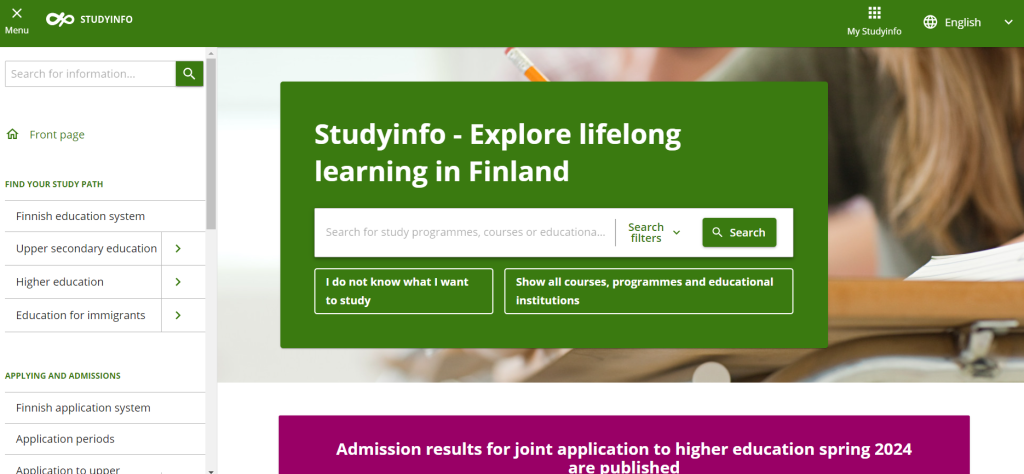Relocate to Finland from Nigeria! It is an exciting opportunity that offers numerous benefits, including world-class education, a high quality of life, and excellent post-graduation opportunities. One of the most effective ways to make this move is through education, whether you’re pursuing a bachelor’s degree, a master’s degree, or vocational studies. Finland’s centralized admission platform, Studyinfo.fi, simplifies the application process, making it easier for international students to apply to multiple programs and institutions from one place.
In this comprehensive guide, we’ll explore the step-by-step process of relocating to Finland from Nigeria using the education route, offering insights and tips to ensure a smooth transition.
1. Why Relocate to Finland from Nigeria for Studies?
Relocating to Finland offers a host of benefits, particularly for students:
- World-Class Education: Finland consistently ranks among the top countries globally for education quality. Finnish universities are known for their innovative teaching methods, student-centered learning, and strong emphasis on research. Read more about Finland’s education system.
- Affordable Tuition Fees: While tuition fees apply to non-EU/EEA students, they are relatively affordable compared to other countries. Additionally, numerous scholarship opportunities are available, such as the Finnish Government Scholarship Pool.
- High Quality of Life: Finland ranks high in global quality of life indexes, with an emphasis on safety, healthcare, and overall well-being. The country offers a clean environment, well-organized public services, and a strong social welfare system. Learn more about living in Finland.
- Post-Graduation Opportunities: Finland offers a variety of pathways for graduates to stay and work in the country. International students can apply for a residence permit extension to search for a job or start a business after graduation. Discover more about post-graduation opportunities.
2. Understanding the Studyinfo.fi Platform
Studyinfo.fi is the official application portal for higher education in Finland. It’s a one-stop platform where you can search for study programs, submit applications, and track the status of your applications. The platform covers all levels of higher education, including bachelor’s and master’s degrees, as well as vocational studies.

Check how to relocate to Switzerland here
Key features of Studyinfo.fi:
- Centralized Applications: Apply to multiple programs across different universities from one platform.
- Comprehensive Search: Filter programs based on your interests, language of instruction, and level of study.
- Easy Application Management: Track your application progress and receive updates directly through the platform.
3. The Step-by-Step Process for Applying to Study in Finland
A. Choosing Your Study Path
- Bachelor’s Degree Programs
- Eligibility: To apply for a bachelor’s degree program in Finland, you need to have completed your secondary education (WAEC/NECO or equivalent). Some programs may require specific subjects or grades.
- Language Requirements: Many bachelor’s programs are taught in Finnish or Swedish, but an increasing number are available in English. For English-taught programs, you’ll need to prove your proficiency in English through tests like IELTS or TOEFL. Check the specific language requirements on Studyinfo.fi.
- Application Process:
- Visit Studyinfo.fi and use the search function to find bachelor’s programs that suit your interests.
- Review the entry requirements for each program to ensure you qualify.
- Prepare your application documents, including educational certificates, language test results, and a motivation letter.
- Apply directly through the platform during the application period, which typically runs from January to March.
- Master’s Degree Programs
- Eligibility: To apply for a master’s degree, you must have completed a bachelor’s degree (or equivalent) in a relevant field. Some programs may also require work experience.
- Language Requirements: Most master’s programs are offered in English. You’ll need to meet the language requirements by providing test scores from recognized English proficiency tests. Check specific program requirements on Studyinfo.fi.
- Application Process:
- Search for master’s degree programs on Studyinfo.fi. Use filters to find programs that align with your academic background and career goals.
- Review the eligibility criteria and ensure your previous studies align with the program’s requirements.
- Prepare your documents, which may include transcripts, degree certificates, language test results, a CV, and possibly a research proposal or portfolio.
- Submit your application through the platform. The application period for master’s programs generally runs from November to January.
- Vocational Studies
- Eligibility: Vocational studies are ideal for students seeking practical skills in a specific trade or profession. Applicants typically need to have completed secondary education.
- Language Requirements: These programs are usually taught in Finnish or Swedish, though some may offer courses in English. Check the language requirements on Studyinfo.fi.
- Application Process:
- Search for vocational programs on Studyinfo.fi.
- Check the entry requirements to ensure you qualify.
- Prepare your application documents, which may include your secondary school certificates, language test results, and a portfolio if relevant.
- Submit your application during the relevant application period, usually between January and April.
B. Submitting Your Application on Studyinfo.fi
- Create an Account: Start by creating an account on Studyinfo.fi. This will allow you to save your searches, track your applications, and receive notifications.
- Fill Out the Application Form: Once you’ve chosen the programs you want to apply to, fill out the application form on Studyinfo.fi. You can apply to multiple programs in one go, but remember to rank them in order of preference.
- Upload Required Documents: Upload all necessary documents, including educational certificates, language test scores, a CV, and any other documents required by the program.
- Pay the Application Fee: Some programs may require an application fee. Be sure to pay this fee to avoid delays in processing your application.
- Submit Your Application: Once you’ve completed the form and uploaded your documents, submit your application. You’ll receive a confirmation email and can track the status of your application through your account.
C. Receiving an Offer and Preparing for Your Move
- Admission Results: After the application deadline, universities will review applications and notify you of the results. If you receive an offer, you’ll need to confirm your acceptance within the specified timeframe.
- Apply for a Student Residence Permit: After accepting an offer, you’ll need to apply for a student residence permit. This is done through the Finnish Immigration Service’s online application system. You’ll need to provide:
- Proof of admission
- Proof of sufficient financial means (usually €6,720 for one year)
- Health insurance covering at least €30,000
- Possible proof of a clean criminal record
- Prepare for Departure: Once your residence permit is approved, start preparing for your move to Finland. This includes securing accommodation, booking flights, and familiarizing yourself with Finnish culture and customs. Learn more about moving to Finland.
4. Life as a Student in Finland
Studying in Finland is a unique experience that combines academic rigor with a high quality of life. Finnish universities are known for their student-centered approach, where students are encouraged to take an active role in their learning.
- Student Services: Universities offer a wide range of support services, including orientation programs, academic counseling, and career services. Student unions also play a crucial role in ensuring a vibrant student life.
- Accommodation: Most universities provide assistance in finding student accommodation, either through university-owned housing or private rentals. Find out more about student housing.
- Cultural Adjustment: Finland has a rich culture that values equality, respect, and sustainability. As an international student, you’ll have the opportunity to learn about Finnish customs and traditions, participate in local events, and explore the country’s stunning natural landscapes.
- Social Life: Finland has a vibrant student community with numerous clubs, societies, and events. Whether you’re interested in sports, arts, or social activism, there’s something for everyone. Explore student life in Finland.
5. Post-Graduation Opportunities
Finland offers favorable conditions for international students to stay and work after graduation:
- Extended Residence Permit: You can apply for an extended residence permit to search for a job or start a business after completing your studies. This permit is typically granted for one year. Learn more about post-study residence permits.
- Job Market: Finland has a dynamic job market with opportunities in various sectors, particularly in technology, engineering, healthcare, and education. As an international graduate, you can leverage the skills and connections you’ve developed during your studies to secure employment in Finland.
- Entrepreneurship: Finland is known for its supportive environment for startups and entrepreneurs. If you have a business idea, there are numerous resources and programs available to help you get started. You can apply for a startup residence permit, which allows you to launch and grow your business in Finland. Learn more about entrepreneurship in Finland.
6. Important Tips for a Successful Relocation
Relocating to Finland from Nigeria involves careful planning and preparation. Here are some additional tips to ensure a smooth transition:
- Start Early: The application process for Finnish universities and residence permits can be time-consuming, so it’s important to start early. Make sure you meet all deadlines and gather the necessary documents well in advance.
- Financial Planning: Ensure you have sufficient funds to cover your tuition fees, living expenses, and other costs. Finnish authorities require proof of financial means before granting a student residence permit.
- Learn the Language: While many programs are offered in English, learning some basic Finnish can greatly enhance your experience and help you integrate into the local community. Many universities offer Finnish language courses for international students.
- Engage with the Community: Join student organizations, attend events, and network with fellow students and professionals. This will not only enrich your experience but also open up opportunities for internships, jobs, and collaborations.
- Stay Informed: Keep up to date with any changes in immigration policies, residence permits, and university requirements. Regularly check official websites like Studyinfo.fi, Finnish Immigration Service, and Study in Finland for the latest information.
7. Conclusion
Relocating to Finland from Nigeria through education is a rewarding pathway that offers numerous opportunities for personal and professional growth. Whether you choose to pursue a bachelor’s degree, master’s degree, or vocational studies, Finland provides a supportive environment for international students.
By using the Studyinfo.fi platform, you can streamline the application process and focus on making the most of your educational journey. With proper planning, financial preparation, and a proactive approach to your studies and integration, you can successfully relocate to Finland and build a bright future.
Relevant Information
- Studyinfo.fi: Centralized platform for searching and applying to higher education programs in Finland.
- Study in Finland: Official site for information on studying and living in Finland.
- Finnish Immigration Service: Information on residence permits, visa requirements, and immigration policies.
- Finnish Government Scholarship Pool: Scholarship opportunities for international students in Finland.
- Business Finland – Startup Ecosystem: Resources and support for entrepreneurs in Finland.
By following the steps outlined in this guide, you can make your dream of studying and living in Finland a reality. Best of luck on your journey!
For more relocation update, visit relocate.com.ng


